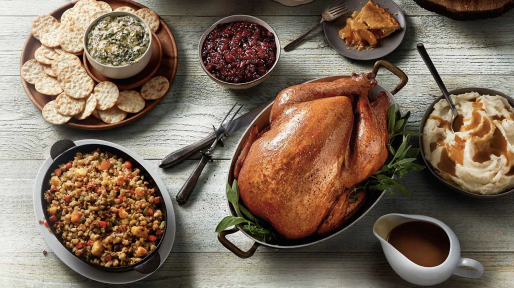Avoid Taboo Topics During the Holidays with Humor
Stuff your holiday dinner conversations with humor instead of inter-family conflict with tips from a communication expert.

by Amber Francis ‘22
The holidays represent many things to the American public: time-honored traditions, expressing heartfelt thankfulness; and yelling at family across the dinner table.

David Tarvin
The holiday season can be a trying time during the best of years, which 2020 is definitely not. Between a hard-hitting pandemic and the volatile climate of American politics, conversations this year seem doomed to be dominated by controversial topics sure to stoke tempers around the dinner table. Avoid the burning desire to go at Uncle Jimmy with the carving knife by using tips and tricks recommended by David Tarvin, a senior lecturer with the Department of Communication who focuses on the rhetoric of humor.
Tarvin recommends avoiding tension-filled conversations if you know they won’t produce any meaningful dialogue.
“Just because you want to stay clear of these conversations doesn’t mean that your family members do,” Tarvin added. “When that occurs, there are a couple of strategies you could use, as every situation is going to be different. Family dynamics vary greatly based on varying perspectives and experiences.”
Tarvin points to humor as an effective way to de-escalate heated discussions. Something as seemingly mundane as cheesy holiday jokes can be used to lighten conversation. Inserting an arguably groan-worthy joke in the middle of a conversation might sound ridiculous, but it’s precisely the ridiculousness of it that actually winds up catching people off-guard enough to deflate the conversation.
Regardless of how good the joke you just told was, it’s inevitable that some family members may not consider the topic at-hand a laughing matter. In that case, Tarvin recommended going for a more subtle strategy: deflection. Rather than abruptly putting a halt to the conversation the way a well-timed joke does, this strategy is about slowly guiding discussion towards less contentious subjects by means of quietly connecting two seemingly unrelated topics.
“This is where we can use pop culture. You can relate their perspective to something in a show or movie that you saw, and then start talking about said show in order to present the front of a semi-political point, but in truth using that to direct the conversation towards pop culture,” he said.
It’s this gradual, natural shift in topic that creates degrees of separation between them and the original topic, transforming the conversation into something friendlier and more enjoyable for all parties involved, as opposed to spending the rest of the meal screaming about mask mandates.
“The goal is not to create arguments,” Tarvin said. “But to tell stories.”
Going into a conversation guns blazing with bold statements and a confrontational attitude is a guaranteed way to ensure that everyone at the table will be debating election fraud, a topic probably nobody in your family is an expert on, for the next hour. Instead, when politics are brought up, try telling a story about something hilarious you saw in line at the polling booth. Or share how you stopped at Starbucks on the way to vote. Then invite people to join your new conversation topic with a question like, “Don’t you think seven dollars is way too much for a cup of coffee, isn’t that so ridiculous?”
Tarvin explained that when someone is talking in political jargon or using language that seems aggressive, avoiding buzzwords is imperative. People may associate certain buzzwords as synonymous with talking points from either side of the aisle and immediately rebuke what you say after hearing them, regardless of your actual statement or the intent behind it. Using words like “privilege” or “racism” may automatically have some individuals on the offensive and ready to brain you with the gravy boat, so instead tell stories hinting at those ideas without explicitly saying those terms.
“In dealing with these situations, it’s a lot of listening and participating and then being incongruous and flipping the script, which is what humor is all about,” Tarvin said. “It’s just being different from what people expect.”
Above all, Tarvin stressed that listening to your loved ones is of the utmost importance and can make a staggering difference to the tone and direction of a conversation. Instead of making assumptions or negating their experiences, take the time to hear what they have to say. Rather than treating Thanksgiving interactions as a foregone conclusion, use the opportunity to gain genuine insight into why your loved ones have their opinions, even if they may be opinions you ultimately disagree with. Show that you’re empathetic to their concerns and needs, taking their experiences into account the same way you would want them to do for you. Be aware that even if you disagree, they can still have a valid opinion just the same as you.
“What’s most important is to not assume you know the other person’s perspective, and instead, actively and authentically listen to them. When you listen, oftentimes you can use humor to navigate those conversations,” Tarvin stated. “If all else fails, just stuff your mouth full of food so nobody can talk to you.”
This Thanksgiving it’s more important than ever that you have the understanding to keep your heart and mind open when listening to your loved ones and the foresight to keep your mouth full when said loved ones ask who you think won the election.
